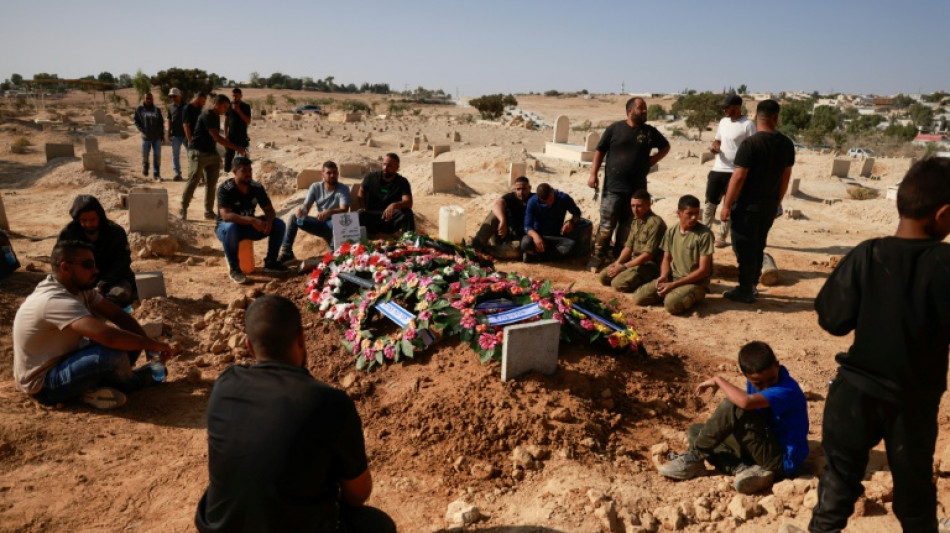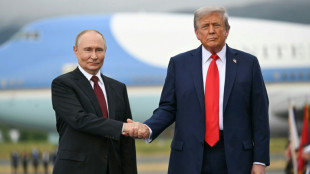

Turkish experts to help find bodies in Gaza, as Trump warns Hamas
Turkey has deployed dozens of disaster relief specialists to help search for bodies under the mountains of rubble in Gaza, as US President Donald Trump fired a warning at Hamas Thursday over a spate of recent killings in the territory.
Trump characterised the killings as a breach of the ceasefire deal he spearheaded, under which the Palestinian militant group returned its last 20 surviving hostages to Israel.
Hamas says it has also handed back all the bodies of deceased captives it can access but the corpses of 19 more are still unaccounted for and believed to be buried under the ruins alongside an untold number of Palestinians.
A Turkish defence ministry source said on Thursday that "there is already a team of 81 AFAD staff there" -- referring to Turkey's disaster relief agency -- indicating that "one team will be in charge of seeking and finding the bodies", including those of the missing hostages.
Hamas has said it needs specialised equipment to retrieve the remaining captives' bodies but the families of the dead have fumed at the group's failure to deliver their loved ones' remains.
The main campaign group advocating for the hostages' families demanded Thursday that Israel "immediately halt the implementation of any further stages of the agreement as long as Hamas continues to blatantly violate its obligations regarding the return of all hostages and the remains of the victims".
At a state ceremony Thursday to mark the second anniversary of the October 7, 2023 attack that sparked the war, Israel's Prime Minister Benjamin Netanyahu said Israel was "determined to secure the return of all hostages".
Defence Minister Israel Katz warned on Wednesday that if Hamas failed to return the bodies, Israel "will resume fighting".
Trump had appeared to call for patience when it came to the bodies' return -- insisting Hamas was "actually digging" for hostages' remains -- but later expressed frustration on Thursday with the group's conduct since the fighting halted.
"If Hamas continues to kill people in Gaza, which was not the Deal, we will have no choice but to go in and kill them," Trump said on Truth Social in an apparent reference to recent shootings of Palestinian civilians.
Hamas has been accused of carrying out summary executions in Gaza since the ceasefire went into effect.
Clashes have also taken place between the group's various security units and armed Palestinian clans, some of which are alleged to have Israeli backing.
- Aid hopes -
The ceasefire deal has so far seen the war grind to a halt after two years of agony for the hostages' families, and constant bombardment and hunger for Gazans.
According to Trump's 20-point plan for Gaza, the next phases of the truce should include the disarmament of Hamas, the offer of amnesty to Hamas leaders who decommission their weapons and establishing the governance of post-war Gaza.
The plan also calls for renewed aid provision, with international organisations awaiting the reopening of southern Gaza's Rafah crossing in the hope it will enable a surge of supplies.
Israeli Foreign Minister Gideon Saar said on the sidelines of a summit in Naples that preparations were being made for the strategic crossing, and that he "hoped" it would reopen Sunday, Italian news agencies reported.
Israel, however, said earlier on Thursday that the crossing would only be open to people, not aid, and Saar did not appear to elaborate, according to the reports.
The humanitarian situation has been dire in Gaza throughout the war, with the UN declaring famine in parts of the north in August.
The World Health Organization has warned that infectious diseases are "spiralling out of control", with only 13 of the territory's 36 hospitals even partially functioning.
"Whether meningitis... diarrhoea, respiratory illnesses, we're talking about a mammoth amount of work," Hanan Balkhy, regional director for the UN health body, told AFP in Cairo.
- 'My children are home' -
The families of the surviving hostages were able, after two long years without their loved ones, to rejoice in their return.
"My children are home! Two years ago, one morning, I lost half of my family," said Sylvia Cunio, mother of Ariel and David Cunio, who were released from captivity.
Israel returned the bodies of 30 Palestinians to Gaza on Thursday, the territory's health ministry said.
Under the ceasefire deal, Israel was to turn over the bodies of 15 Palestinians for every deceased Israeli returned.
For many in Gaza, while there was relief that the bombing had stopped, the road to recovery felt impossible, given the sheer scale of the devastation.
"There's no water -- no clean water, not even salty water, no water at all. No essentials of life exist -- no food, no drink, nothing," said Mustafa Mahram, who returned to Gaza City after the ceasefire.
"As you can see, all that's left is rubble."
The war has killed at least 67,967 people in Gaza, according to the health ministry in the Hamas-run territory, figures the United Nations considers credible.
The data does not distinguish between civilians and combatants but indicates that more than half of the dead are women and children.
Hamas's October 7 attack on Israel resulted in the deaths of 1,221 people, mostly civilians, according to an AFP tally based on official Israeli figures.
O.Greco--RTC


